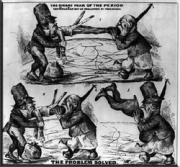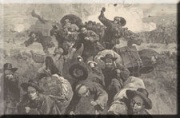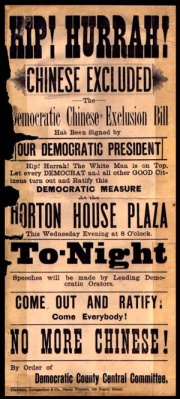Intolerance, Legislative Harassment, and Exclusion
From The Peopling of NYC
Chinese immigrants endured a wave of violent racist attacks during their first few decades in the United States. All across the country, especially in areas such as Seattle, Los Angeles, and small towns in Wyoming, the Chinese were forced to withstand a movement of murder and persecution against them. These first immigrants were forced out of business, run out of town, beaten, tortured, massacred, lynched. Of no help to the escalating violence was the government, which usually provided little or no help. The main reasons for the violence were racial hatred, an uncertain economy, and a weak government. Because of the last reason, most of the Americans who perpetrated the crimes against Chinese immigrants did not receive punishment of any sort.
Around the same time the Chinese had to deal with the violent attacks, they were also troubled by anti-Chinese legislation. Many penal regulations and laws were passed, most of which were targeted at the Chinese immigrant population. In 1870, the Sidewalk Ordinance Act was passed, which banned the Chinese method of carrying vegetables and laundry on a pole. Another law, the Foreign Miners License Tax law, required all non-native born workers to pay the outrageous rate of twenty dollars per month for the right to mine. In San Francisco, the Queue Ordinance was enacted in 1873, outlawing the Chinese custom of men wearing long braids. Chinese immigrants were could not work for local, state, and federal governments, or lawfully educate their children in public schools. In addition, they could not testify in court against Americans of European descent for decades, which actively prevented their protection by the law. During the 1870s, the worsening economic depression only increased hostility towards the Chinese. Chinese immigrants were blamed for lowering wages and increasing the unemployment rate.
In 1882, a landmark act was passed by Congress-the Chinese Exclusion Act. It excluded Chinese laborers from the country under the penalty of imprisonment and deportation. After the act was passed, all Chinese immigrants became permanent aliens, because it excluded them from U.S. citizenship. Any hope of starting families in their new home seemed dim or nonexistent to Chinese men. The Chinese Exclusion Act was the first significant barring on free immigration in United States history. The Exclusion Act, along with other restrictions that followed, severely halted growth of the Chinese community in the United States. Only until the mid-twentieth century were the restrictions loosened and/or lifted.
For the first several decades that the Chinese came to the U.S., they were occupied with merely surviving. The story of their endurance is mostly undocumented and unknown. However, from their harsh beginning in United States history, the Chinese American experience has changed radically, developing into a community with vitality and strength.
Sources
- Immigration: The Journey to America-The Chinese
- Chinese Immigration: Chinese Exclusion Act of 1882
- The History of Chinese Immigration


